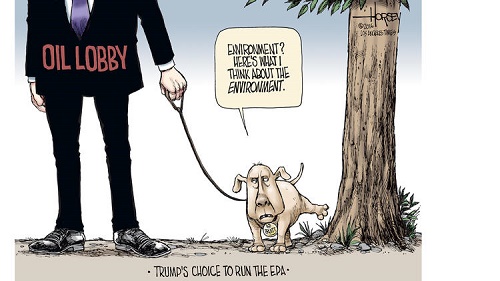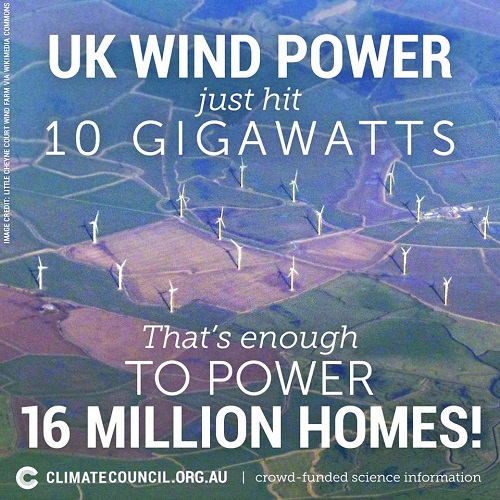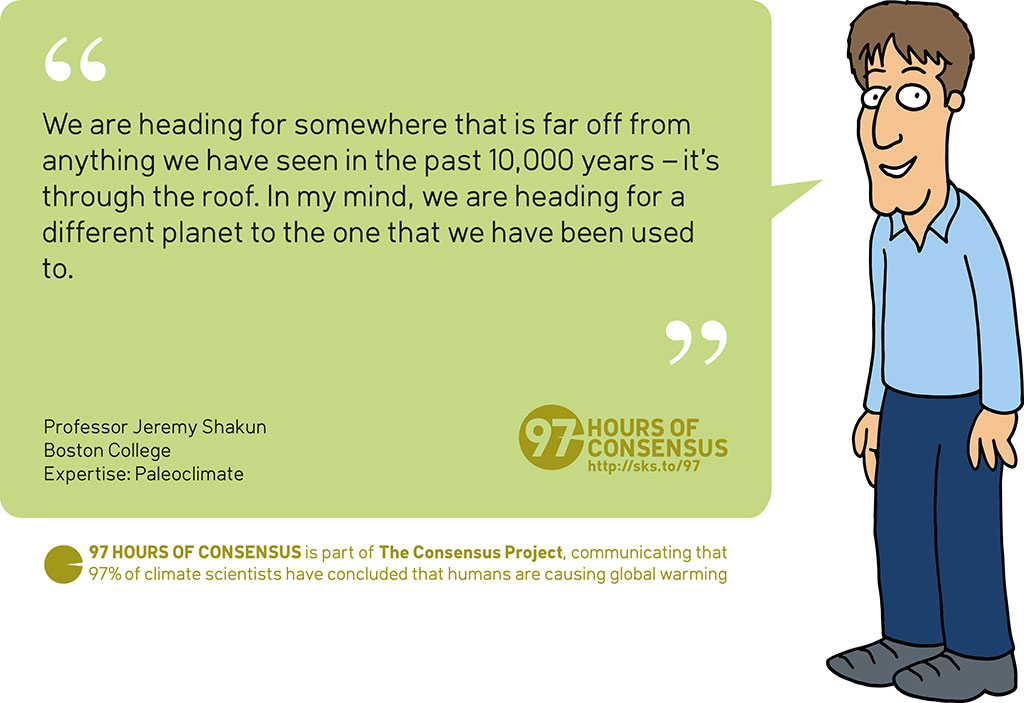2016 SkS Weekly Climate Change & Global Warming Digest #51
Posted on 18 December 2016 by John Hartz
Story of the Week... Video #1 of the Week... SkS Highlights... Toon of the Week... Quote of the Week... Video #2 of the Week... SkS in the News... SkS Spotlights... Coming Soon on SkS... Poster of the Week... SkS Week in Review... 97 Hours of Consensus...
Story of the Week...
Shrinking glaciers are ‘categorical evidence’ of climate change, study says
It is virtually certain that the retreat of many glaciers around the world has been caused by climate change, a new study suggests.
Using records of glacier length that go back over 400 years, the researchers show that shrinking of mountain glaciers in five continents could almost certainly not have happened if the Earth wasn’t warming up.
The findings suggest that future reports from the Intergovernmental Panel on Climate Change (IPCC) should have stronger conclusions around how human-caused climate change is affecting the world’s glaciers, the researchers say.
Attribution
The study, just published in Nature Geoscience, is the latest in the relatively new field of attribution, where scientists identify the fingerprints of human influence on observed changes in temperature, rainfall, and other climate parameters.
Attribution studies typically focus on specific extreme events. Recent research has found, for example, that climate change boosted the odds of the UK’s very wet winter in 2013-14 by 43%. Another paper identified how many extra deaths there were in London and Paris during the 2003 summer heatwave because of our warming climate.
Rather than an event of a few hours, weeks or months, the new study looks at how glaciers have changed over the past century.
The near-global retreat of these rivers of ice “seems improbable” without the influence of climate change, the paper says, but most studies to date have only been able to test this theory on a few glaciers at most.
So the researchers collected together records of glacier length for 37 glaciers in North America, South America, Europe, Asia and Australasia. The records were selected for their length and completeness – the longest goes back to 1534.
Shrinking glaciers are ‘categorical evidence’ of climate change, study says by Robert McSweeney, Carbon Brief, Dec 12, 2016
Video #1 of the Week...
SkS Highlights...
Using the metric of comments garnered, the three most popular articles posted on SkS during the past week are:
- On climate change, angels and demons are battling over Trump’s soul by Dana Nuccitelli (Climate Consensus - the 97%, Guardian)
- Why Coal Is Not Our Future by Riduna
- This is not normal – climate researchers take to the streets to protect science by Dana Nuccitelli (Climate Consensus - the 97%, Guardian)
Toon of the Week...

Trump’s Cabinet will serve corporate interests, not the chumps who voted for him, Opinion by David Horsey, Los Angeles Times, Dec 13, 2016
Quote of the Week...
Scientists will need to speak up about their research and the importance of scientific integrity — or risk not being heard by the incoming administration, said US Interior Secretary Sally Jewell at the meeting of the American Geophysical Union today.
Her talk was a carefully worded call to arms for scientists to become part of the political process. “If you’re not at the table, you’re on the menu,” she said. Part of that will require learning how to talk about science not only in the kind of language a layperson can understand, but also in the language of dollars and cents. Communicating science’s value will be critical in order to appeal to an increasingly business-oriented administration.
“When you have a President-elect of the United States that’s in the real estate development business, your science matters,” she said. “Nobody wants to build a building in harm’s way if they’ve got good data that tells them where they can build it out of harm’s way.”
Researchers must convince Trump that science matters, interior secretary says by Rachel Becker, The Verge, Dec 14, 2016
Video #2 of the Week...
NASA, the US space agency, has released an “eye-popping” three-dimensional animation showing carbon dioxide emissions moving through the Earth’s atmosphere over the course of a year.
It says the 3-D visualisation is “one of the most realistic views yet” of the “complex patterns in which carbon dioxide in the atmosphere increases, decreases and moves around the globe”.
The data used to produce the visualisation was collected by NASA’s Orbiting Carbon Observatory-2 (OCO-2) satellite from September 2014 to September 2015. The data was then modelled and visualised by the Global Modeling and Assimilation Office at NASA’s Goddard Space Flight Center in Greenbelt, Maryland.
Video: NASA produces first 3D animation of global carbon emissions by Leo Hickman, Carbon Brief, Dec 14, 2016
SkS in the News...
[To be added.]
SkS Spotlights...
The Clean Energy Leadership Institute (CELI) is a 501(c)(3) leadership development organization working in Washington D.C. and the San Francisco Bay Area. CELI provides early career professionals with the technical content, leadership development, and a professional community to build the next generation of clean energy leaders.
CELI believes that our clean energy future must be powered by diverse, effective, and innovative leaders. We recruit Fellows with diverse backgrounds and equips them with a strong working knowledge of energy markets, project finance, technology innovation and public policy, realized through the Clean Energy Leaders Fellowship program.
Coming Soon on SkS...
- The Perfect Tide: Sea Level and the Future of South Florida (Peter Sinclair)
- Hacking Hillary and climate scientists – a devious new playbook emerges (Dana)
- Trump questionnaire recalls dark history of ideology-driven science (Paul Edwards)
- Guest Post (John Abraham)
- Infographic: climate change and 2015’s year of wild weather (Andrew King)
- 2016 SkS Weekly Climate Change & Global Warming News Roundup #53 (John Hartz
- 2016 SkS Weekly Climate Change & Global Waming Digest #53 (John Hartz)
Poster of the Week...

SkS Week in Review...
- 2016 SkS Weekly Climate Change & Global Warming News Roundup #51 by John Hartz
- This is not normal – climate researchers take to the streets to protect science by Dana Nuccitelli (Climate Consensus - the 97%, Guardian)
- Why Coal Is Not Our Future by Riduna
- Oceanographers offer clues to Malaysian airlines crash by John Abraham (Climate Consensus - the 97%, Guardian)
- Climate Science Legal Defense Fund at AGU and how you can help by Guest Author
- On climate change, angels and demons are battling over Trump’s soul by Dana Nuccitelli (Climate Consensus - the 97%, Guardian)
- Skeptical Science at AGU 2016 by John Cook
- 2016 SkS Weekly Climate Change & Global Warming Digest #50 by John Hartz
97 Hours of Consensus...
































 Arguments
Arguments






























If we are now makeing a strategic retreat and talking about living with climate change rather than (or in addition to) trying to stop it, we need a substitute for Glaciers. We need something that will hold water during off-growing periods and release the water in the summer. We need to hold the water on the land in order to recharge water tables rather than letting the water rush down to the sea. It would also be nice to catch silt from poor farming and poor land use and keep it where it will so some good in the future. If in addition we can improve our ecology, that would be a bonus. https://www.youtube.com/watch?v=wI5AjJd00cM
In the comments section under the article in Carbon Brief re glacial melt, there is a scientist promoting a paper in which he claims the current trend in glacial melt is part of a natural cycle. I was wondering if anyone knows of this scientist and his work? I think the online journal he has published in looks very dubious, but according to Wikipedia, it is peer reviewed.
https://www.carbonbrief.org/shrinking-glaciers-categorical-evidence-climate-change
http://www.academia.edu/8915481/Aryas_C_Cycle_-_Climate_change_natural_---Dr_Ritesh_arya
Jonbo69,
He may be scientist but he is outside his science with that paper (access via Google Scholar). And he is also operating way outside his competence. Even allowing for the poor English, the paper is entirely nonsensical.
JonBo69 @2, wikipedia says that "Academia.edu proclaims it supports the open science or open access movements and, in particular, instant distribution of research, and a peer-review system that occurs alongside distribution, instead of prior to it." Given that there is "instant distribution" and that "peer review" occurs "alongside distribution, instead of prior to it", it follows that publication on Academia.edu requires no prior peer review. Further, without accessing the actual peer review comments we cannot say anything about the standard, or even existence of actual peer review of the paper. A quick search for "Arya C Cycle" on google scholar shows that only the paper you link to discusses it. A more general google search shows the only person talking about it on the web is the original author. Apparently it is an idea so bad that even AGW deniers are not interested in pushing it. Except, apparently, you ...
Jonbo@69, I wouldnt get too worried about skeptical research papers. There is a lot of complete nonsense out there, and I have given up worrying about it, unless it gets the attention of websites like this.
Here is an example. I recall a paper by Roger Pielke. Now this guy is actually a highly qualified sceptical climate scientist, who claimed there had been no sea level rise since 1970. Now this guy does have some real expertise, but I still had big doubts, because what he was saying was so far outside the consensus.
A google search revealed a paper published attacking the Pielke paper, authored by no less than 50 scientists. It became plain to even to non climate scientist like me their criticisms were totally valid. Pielke had no understanding of satellite data on sea level rise, and was outside his area of expertise, basically. And this guy was at least qualified in climate science, so if he is wrong, the people on the fringes are even more likely to be wrong.
Thanks for the feedback. I've already had a bit of a go at the author re the quality of the site he has published on, whlie trying to remain polite considering what he was writing seemed totally bonkers. I was just wondering if he was a known 'skeptic' but it seems he does not even qualify as that, and whether he deserved a more comprehensive rebuttal, but it doesn't seem worth it. It just seems a bit of a cheek to link to his trashy paper and talks that he's given as a response to a paper published in Nature Geoscience.
Turns out that snow has fallen in (a location in) the Sahara for the first time in 37 years. You were probably deafened by the denier chorus of "so much for global warming". What the deniers show is only how poor is their fact checking. In this instance, the snow fell at the Algerian town of Ain Sefra, a full kilometer above sea level in the Atlas Mountains. That high altitude results in low winter temperatures, with an average December range from 0.9 - 12.9 C, and a record minimum of -10.2 C. So the deniers are flaberghasted that snow should fall at a location that often experiences sub zero temperatures.